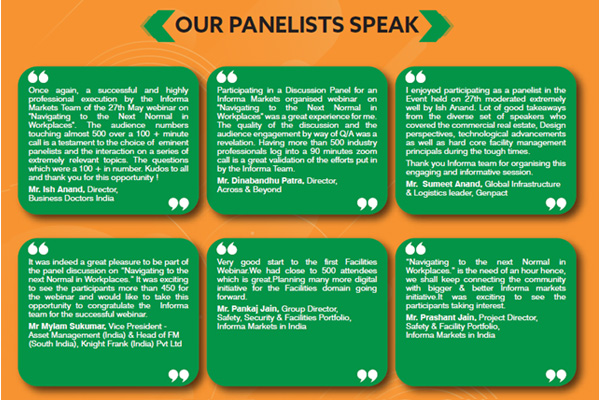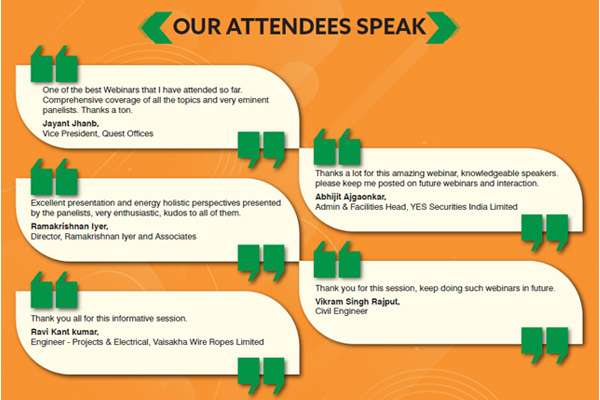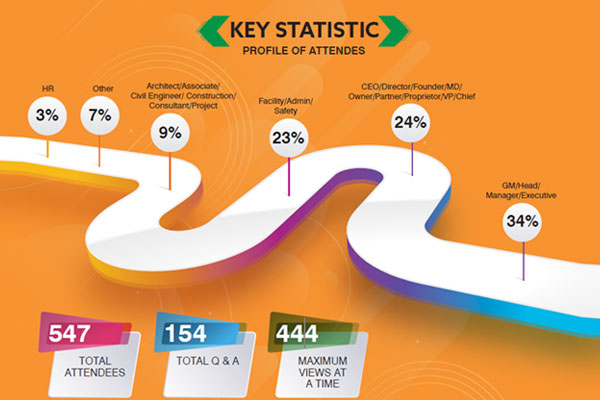
Webinar Post-Show Report: Navigating to the Next Normal in Workplaces, Held on 27th May
“Navigating to the Next Normal in Workplaces,” the webinar organized by Facilities Show India on May 27, 2020 saw a great discussion ontrends and patterns which will drive workplaces in the days to come.The key takeaways and viewpoints from the diverse set of speakers, wasthat post covid-19 , buildings and facilities will see more automation in abid to reduce human interface. Dense spaces will now give way for openlayouts and free flowing areas. Workplace efficiency, reduction of costs,work from home, common shared working spaces would be some of the
dominant trends. Depending on the corporate requirements,decentralized office spaces would be used as a means toderisk whereinif one facility is closed, another office could operate.
Health and safety will see more importance in facility management whiletechnology and retrofitting will play a dominant role in office spaces tohelp adhere to compliances.Even while corporates will look into redesigning office spaces this wouldbe done keeping in mind cost implications and the budgets they have.Just as LEED Certification, we would see wellness certificates fromdevelopers to certify buildings and help improve productivity.According to IFMA’S Mahender Singh, The New Normal will see new agethinking, new processes new technologies. Upscaling and reskilling willdominate workplaces and employees will have to adapt to this. MylamSukumar from Knight Frank mentioned we would see a paradigm shiftand it is important for corporates to build confidence amongst peoplewhile fulfilling expectations with regard to social distancing and othernorms. Comprehensive guidelines are yet to be issued by thegovernment.
Neither India nor the western world have reached any sense of normalcy,hence given the budget constraints, technology, retrofitting andreconfiguration would assume prime importance in workplaces.Elaborating, Dinabandhu Patra said sensors, low touch interactivesystems will dominate. Air quality will be paramount and BIM will be ableClick here to watch the recording of Webinarto integrate the facility and the person who works there. Mobile IOT willbe able to track every individual and would be useful for detection andother purposes.Reducing staff commute, decentralized offices, offices closer to homes,conference facilities in offices, would be some ways of reinventingoffices.
The 90 minute session was moderated well by Ish Anand and saw morethan 500 attendees login, testimony to the eminent panel, quality ofdiscussion and audience engagement.The various perspectives from real estate, facility management,occupier, design and technology summarized into a consensus that wewill see less populated offices, the need to take personal responsibility
It remains too early to say how and when economies will return to normal and what that new normal will look like. Despite the uncertainties, it is possible to make some tentative predictions. Safe and healthy workplaces is at the centre of what’s next in business. As businesses open up, facility professionals are among the unsung heroes who ensure that individuals come back in confidence to a healthy and safe facility
Companies are envisioning a new normal, prioritizing additional space, sanitation and flexibility with more employees working from home on a semi-regular basis. Use of technology, conserving energy would be other focus areas. Covid 19 will help shape the next phase of the modern office, becoming an accelerator and an influencer to the evolutionary nature of workplaces.
Key changes would include deep emphasis on cleaning, use of antimicrobial materials, disinfecting UV lights, which can clean not only equipment like keyboards but entire rooms overnight, use of robots. Companies will be installing more sensors to reduce touch points, such as on light and power switches and door handles, more and better air filtration, temperature monitoring at entry points, desks that are spaced farther apart, plus subtle design features that remind people to keep their distance. HVAC systems designs have to be looked at with a different perspective.
The very concept of the modern office sharing desks and other facilities -- which seemed so normal just a few weeks ago now appears antithetical to safety and productivity.
A number of corporates are taking a very cautious approach in terms of percentage of people reentering the workplace and are looking at longer term work from home programs. As the massive work-from-home experiment moves from a few weeks to months, remote work is here to stay, believe experts-- and companies including Microsoft and Zillow have suggested they will be extending their remote work policies going forward.
A new ecosystem may not require a five-day occupancy in office, especially if we have a longer, two yearcovid journey. Experts are bullish on the future of remote work and bearish on overall future of office space demand.
Even if you follow the six-foot protocols for work stations, there are other common areas in traditional offices where social distancing becomes more difficult. "It's becoming clear that we are not going back to what was normal as of January 2020.” Expect a complete change of origin.
Says Sundar Nagarajan, Head of Consulting at Commercial real estate firm JLL, "The goal is not to bring 100 people just because you can safely have people sit on a floor with social distancing," "The goal is to bring as few people as possible to keep their businesses ongoing, because every person that you bring that is not necessary in the office, you are adding that much of a risk to those who are absolutely necessary in the office.”"The question is who needs to come, rather than how many can come," he adds.
People have to start to really thinking about what is the future of work, what is the future of their business, and how does the workplace support that business."






